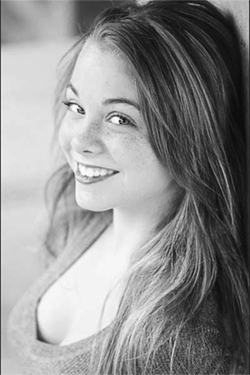 FFRF awarded Tori a $2,000 scholarship.
FFRF awarded Tori a $2,000 scholarship.
By Savannah “Tori” Roland
My name is Tori. I once was blind, but now I see. This is my story.
As an adolescent, I felt lost, hopeless and alone. I searched for something to take away the pain. Caroline, a Christian neighbor, leapt to my rescue. She told me that if I accepted Jesus as my lord and savior, He would forgive all of my sins. How I longed for unconditional love and acceptance! I was so excited to begin this journey!
And so I called myself a Christian. I followed Caroline to church every Wednesday and Sunday. The teen program often offered free pizza and soda, and there were so many other kids to hang out with! I had never been to a rock concert, and then the church brought in a rock band! Freaking awesome! I was addicted to all of the joy and excitement at this wonderful place.
I began to attend Bible Club meetings at lunchtime at my public school. Instead of having to eat the awful school lunches, we got to eat Papa John’s pizza. It was so good to be a Christian! My brother, who had not been saved, was angry that he did not get Papa John’s for lunch.
One day he asked the head of the meeting for some pizza. The response was, “You have to be good to get pizza.”
Occasionally, Caroline and I attended Sunday sermons at church. They were not always so happy and uplifting. The pastor often preached about the people who would burn in hell — some for not truly believing in God, some for worshipping the wrong God, some for not being baptized, some for being homosexual.
Around election time, sermons focused on political issues, like how the conservative Christians needed to stay in power to keep the U.S. on the right track. Sometimes the pastor would preach directly from “The Good Book,” which was often frightening. God seemed overly emotional, demanding, angry, power-hungry. This was a peaceful, loving God?
I often ate dinner with Caroline and her parents. It started with a prayer, the prelude to frequent arguments, usually about whether Caroline’s mother Sally should get up from the table to fetch something for Caroline’s father Richard.
Richard often read bible passages to prove his assertion that women are men’s servants. Sally’s argument was quite reasonable: She had already cooked and served the meal. Now she would like to sit down and enjoy it.
Out of the closet
In my freshman year, I moved to a different school. It was here that I met gay and bisexual students. I witnessed the hate and judgment emanating from Christians. A boy slammed my friend Josh into a locker, proclaiming him “fag” as he did so. Other students laughed and jeered. This motivated me to become involved with the LGBT club and to take a very close look at my Christian friends and their beliefs.
I had seen Christians treating people of alternate faiths with scorn. I had seen God used as an excuse to justify hatred and discrimination against women and gays. I had seen Satan used as an excuse for alcohol abuse, drug abuse and adultery. I had allowed a group of Christians to tell me what to believe and how to live my life.
I had seen no evidence to prove the existence of God. I started calling myself a nonbeliever and came out of the closet to family and friends.
My mother and stepfather, who are atheists, were thrilled. My father and stepmother, who are evangelical Christians, exclaimed, “You will burn in hell!” and “I will pray for your soul.” My Christian friends proclaimed, “You can’t believe in nothing!” Even my brother, who was never religious, was appalled.
I began attending activities with local secular groups and frequented secular blogs such as The Friendly Atheist. Learning that I was one of millions of nonbelievers helped me to feel less alone.
I was appalled to learn that atheists are distrusted and hated by the vast majority of Americans, which causes many atheists to remain closeted. How to overcome the negative stereotypes?
There is power in numbers, so atheists must come out of the closet and band together. We must be active in secular groups and visible and helpful in the community. With a large, visible presence and a new, positive reputation, people who question the existence of God will no longer fear being ostracized by society, or fear being struck by a lightning bolt hurled by an enraged God.
Sadly, critical thinking is sorely neglected within the public school system. Far too much emphasis is placed on memorization. In three years, I will be an elementary school teacher, and I will use this opportunity to teach children to use their noodles.
I imagine a future where atheists are regarded as moral and intelligent human beings. I imagine a future where individuals seek truth via scientific study and critical thinking, rather than through the bible.
I dream of a future where politicians can openly express atheist beliefs and still have a fair chance of becoming president of the United States. I dream of a future where individuals who were once blindly faithful can attain 20/20 vision.
Savannah “Tori” Roland, 18, grew up in Charleston, S.C., where she’s a sophomore at the College of Charleston, majoring in elementary and secondary education.

